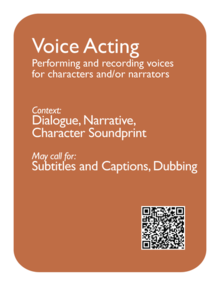Difference between revisions of "Voice Acting"
ValterAlves (Talk | contribs) m |
ValterAlves (Talk | contribs) m |
||
| Line 14: | Line 14: | ||
| revisions =Introduced in version 1.0 | | revisions =Introduced in version 1.0 | ||
| description = | | description = | ||
| − | |||
In some games the use of [[Dialog]] is complemented with [[Voice Acting]]. The adoption of [[Voice Acting]] implies important decisions – beyond creativity – namely because of the costs that may be implied. | In some games the use of [[Dialog]] is complemented with [[Voice Acting]]. The adoption of [[Voice Acting]] implies important decisions – beyond creativity – namely because of the costs that may be implied. | ||
| + | [[Voice Acting]] enhances the way [[Dialog]] contributes to the [[Emotional Script]]. Certain features of voice such as intonation are very direct indicators of the intended emotions. Still, it is relevant to be aware that these features can be cultural dependent. | ||
| − | |||
| − | |||
[[Voice Acting]] may add great value to the game product. Similarly to what happens in animated films, contracting well know actors to give voice to characters not only contributes to the quality of this feature but, very importantly, it can be a powerful marketing argument. Yet, this is the kind of strategy that is prohibitive to small budget projects. | [[Voice Acting]] may add great value to the game product. Similarly to what happens in animated films, contracting well know actors to give voice to characters not only contributes to the quality of this feature but, very importantly, it can be a powerful marketing argument. Yet, this is the kind of strategy that is prohibitive to small budget projects. | ||
| + | Adopting a language for the [[Voice Acting]] is an important matter. It can become a handicap for players that are not able to understand that language. As in film practice, the inclusion of [[Subtitles and Captions | Subtitles]] allow to reduce the issue but is not always convenient, namely because it takes to the visual plane a message that could otherwise be dealt with strictly through sound. [[Dubbing]] is for that matter a better approach, but again may be too costly. | ||
| − | + | A form of giving voice to characters that reduces the problems of internationalization is to design a pseudo-language. Although they are theoretically less effective in communicating exact contents, pseudo-languages have several advantages beyond tackling at the problems of language and culture. Pseudo-languages can be designed to emphasize the communication of emotions and simple signalling, through the exploration of intonation and timing [REF]. | |
| examples= | | examples= | ||
| ex1=<mt p="VoiceActing" g="Uncharted" h="140"></mt> | | ex1=<mt p="VoiceActing" g="Uncharted" h="140"></mt> | ||
| ex2=<mt p="VoiceActing" g="FableIII" altg="Fable III" h="140"></mt> | | ex2=<mt p="VoiceActing" g="FableIII" altg="Fable III" h="140"></mt> | ||
}} | }} | ||
Revision as of 19:24, 16 August 2011

|

| |
| The card's front face | The card's back face |
Contents
Synopsis
| Performing and recording voices for characters and/or narrators. |
Relationships
Context:
Dialogue ![]() , Narrative
, Narrative ![]() , Character Soundprint
, Character Soundprint ![]() .
.
May call for:
Subtitles and Captions ![]() , Dubbing
, Dubbing ![]() .
.
Description
In some games the use of Dialog is complemented with Voice Acting. The adoption of Voice Acting implies important decisions – beyond creativity – namely because of the costs that may be implied.
Voice Acting enhances the way Dialog contributes to the Emotional Script. Certain features of voice such as intonation are very direct indicators of the intended emotions. Still, it is relevant to be aware that these features can be cultural dependent.
Voice Acting may add great value to the game product. Similarly to what happens in animated films, contracting well know actors to give voice to characters not only contributes to the quality of this feature but, very importantly, it can be a powerful marketing argument. Yet, this is the kind of strategy that is prohibitive to small budget projects.
Adopting a language for the Voice Acting is an important matter. It can become a handicap for players that are not able to understand that language. As in film practice, the inclusion of Subtitles allow to reduce the issue but is not always convenient, namely because it takes to the visual plane a message that could otherwise be dealt with strictly through sound. Dubbing is for that matter a better approach, but again may be too costly.
A form of giving voice to characters that reduces the problems of internationalization is to design a pseudo-language. Although they are theoretically less effective in communicating exact contents, pseudo-languages have several advantages beyond tackling at the problems of language and culture. Pseudo-languages can be designed to emphasize the communication of emotions and simple signalling, through the exploration of intonation and timing [REF].
Examples


